Emcee Farah Nasser, News Anchor, Global News, set the tone at the 2023 Catalyst Honours Conference & Dinner with her welcome remarks: “We’re going to chart a course for the future where every individual has a chance to succeed.”
The event on 15 November, held in Toronto and online, gathered hundreds of business leaders from Canada’s major corporations. With nearly 50 expert speakers, attendees gained critical insights on advancing diversity, equity, and inclusion (DEI) in the midst of major crises.
“At a time of war, terrorism, and a backlash against DEI, it’s important to remember the small moments of joy we experience throughout the day,” said Dr. Julie Cafley, Executive Director, Catalyst Canada. “I urge each of us to think about this question: where do I find the pockets of joy in my work? What are those micro moments that impact and inspire?”
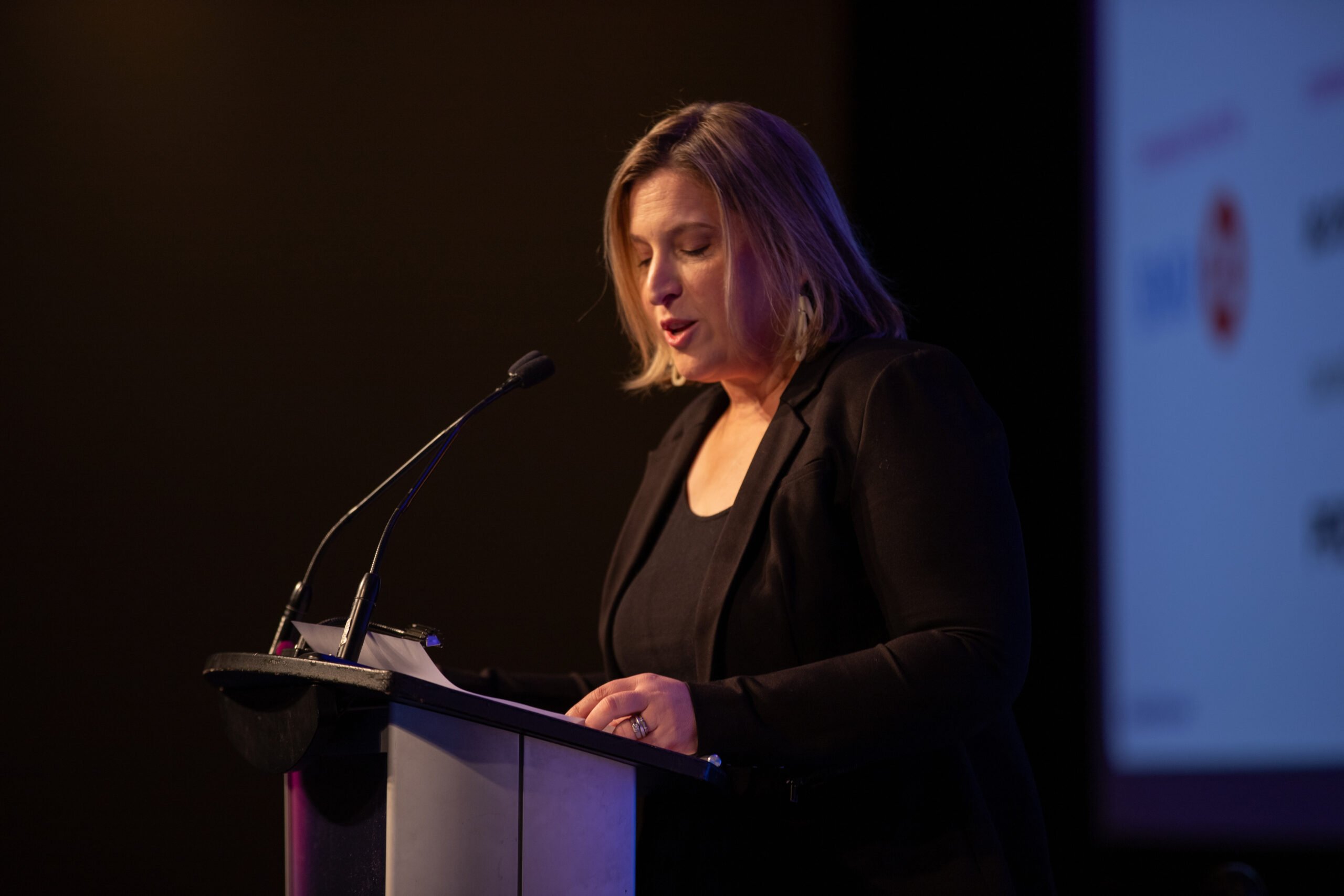
Attendees also celebrated and learned from eight incredible leaders—the 2023 Catalyst Honours Champions—who are making real impact in building more inclusive and equitable workplaces.
Here are the six top takeaways from the event:
- Storytelling is crucial to making others feel seen and heard.
- Companies should adopt new technology with an equity-first lens.
- Acknowledging mistakes is the first step to progress.
- DEI programs must include women in frontline roles.
- “Allyship is transferring the benefits of your privilege.”
- Nothing is more important than talent.
Storytelling is crucial to making others feel seen and heard.
Opening keynote speaker Tanya Talaga—a journalist, author, and director—championed the transformative power of storytelling. She said that uplifting Indigenous stories is key to “finding the path forward” for reconciliation in Canada.
As a journalist at the Toronto Star, Talaga challenged stereotypical newsroom narratives framing Indigenous communities. Her investigative work in Thunder Bay led to impactful books like Seven Fallen Feathers and All Our Relations, spotlighting stories of missing Indigenous students and the epidemic of Indigenous youth suicide.
She urged listeners to trust their inner voice, saying, “When you start listening to that voice inside of your head, follow it. It’s always right.”
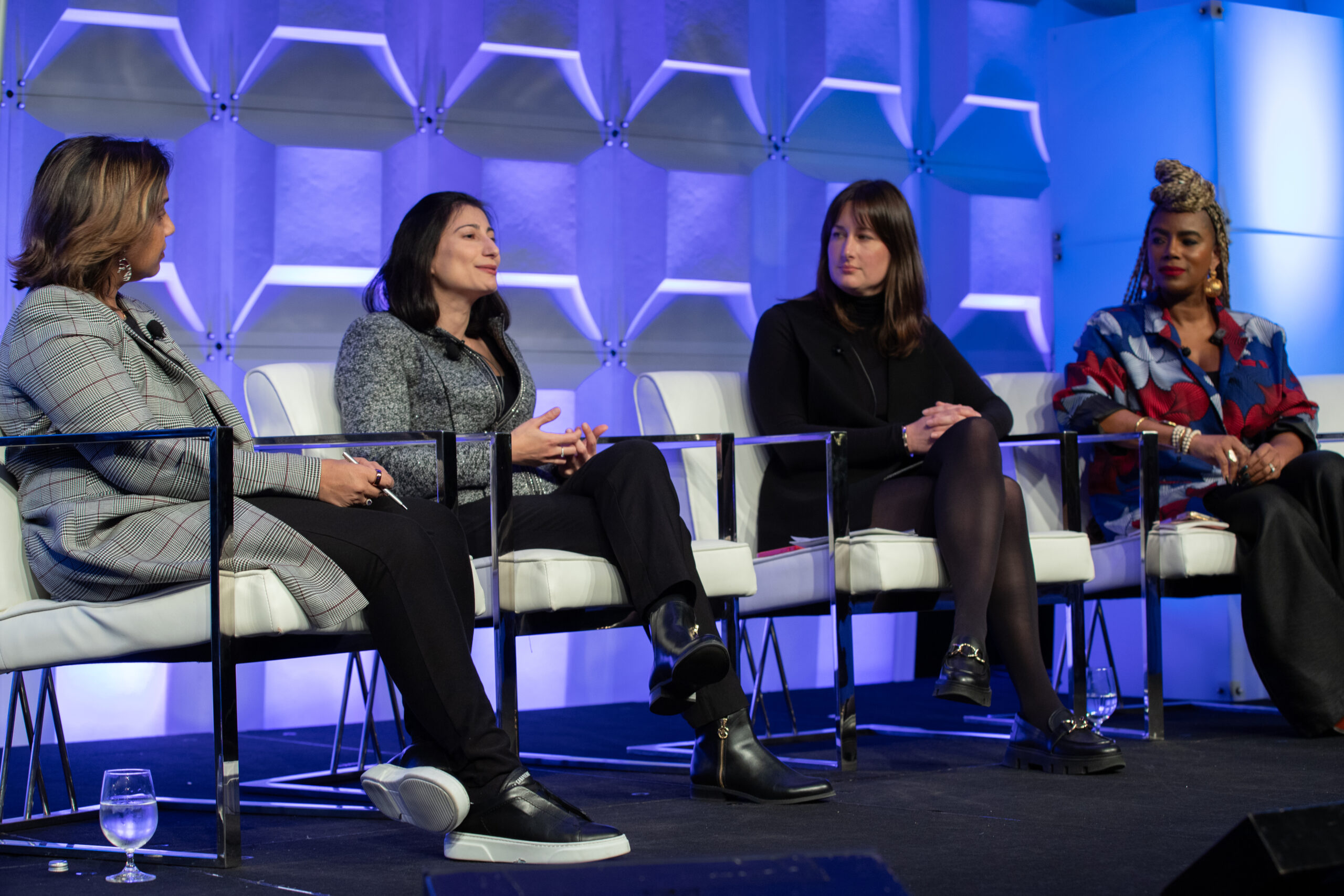
Companies should adopt new technology with an equity-first lens.
In a session on artificial intelligence (AI), panelist Yara Elias of EY Canada spotlighted the representation and inclusion challenges that exist in modern AI. “With generative AI, it’s spitting back to us all of our biases.”
“I want to address the elephant in the AI room: current AI is built on a white racial frame,” added Karlyn Percil of KDPM Equity Institute. “We have to talk about going beyond AI and talk about human equity.”
To that point, Anna Jahn from Mila – Quebec Institute and others urged everyone to claim a seat at the table, saying, “Every discipline needs to contribute to the conversation around AI. A lot of computer scientists have no training in ethics. Be confident about what you can contribute.”
Each panelist emphasized the power and responsibility we have over the trajectory of the AI industry. Yara said, “We can decide how we’re going to build AI. We can [and should] accept a bit of decline around performance for the sake of fairness.”
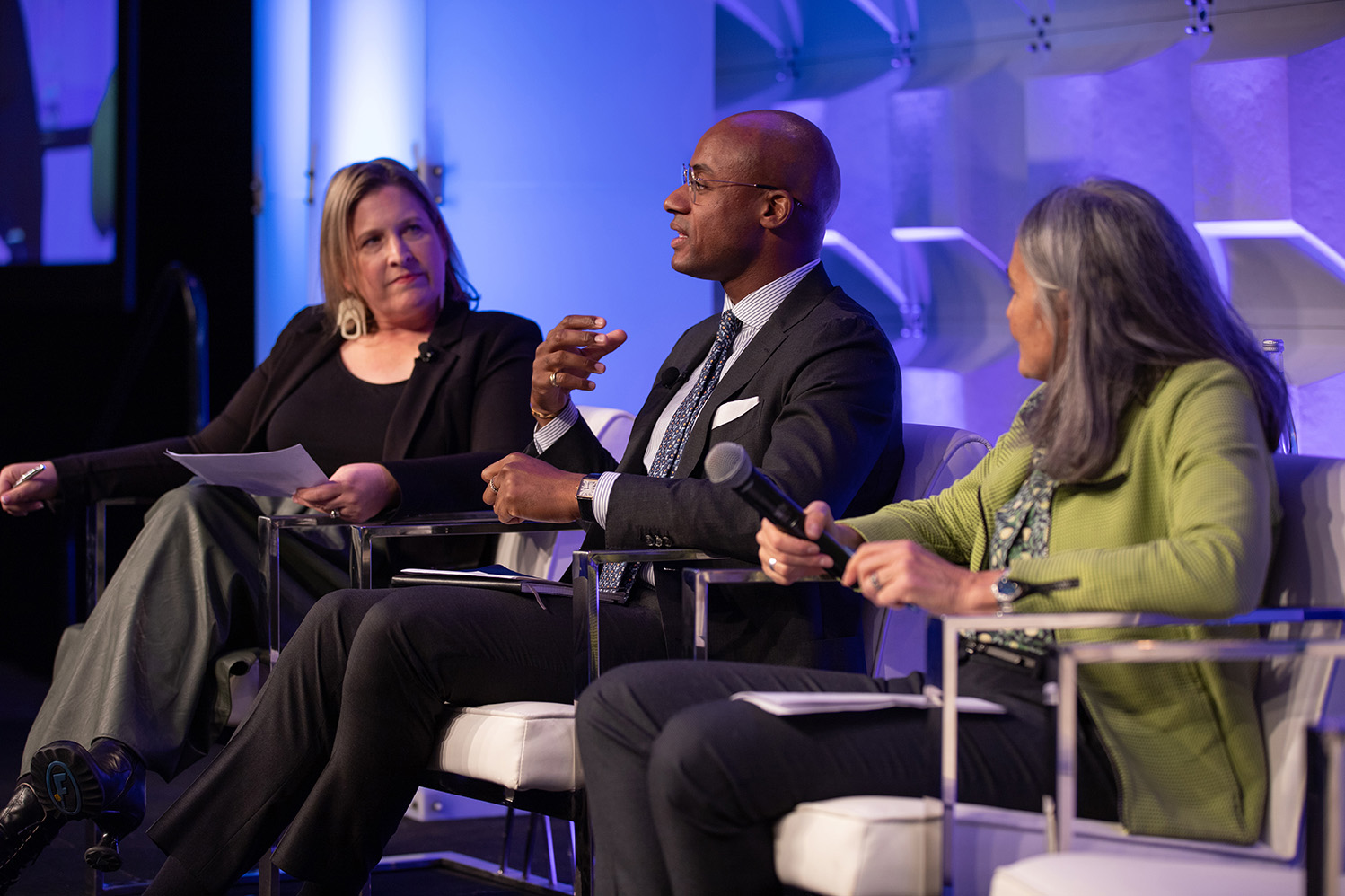
Acknowledging mistakes is the first step to progress.
David Simmonds of Canada Life talked about the need for employers to create cultures that allow for people to make mistakes while simultaneously ensuring spaces of safety and authenticity for 2SLGBTQ+ employees in the session “From Flags to Fulfillment: Failing Forward on 2SLGBTQ+ Workplace Inclusion to Advance Concrete Change.”
“When [Canada Life] talks about innovation, we put failure as a key requirement,” he said. “We talk about learning lessons from failures… At no point is hurting individuals appropriate, but we have to invite people to be part of a space where we build a better culture.”
Co-panelist Amy Hanen of TD Bank Group talked about the challenges of moving beyond performative allyship to genuine commitment. “In moments of backlash, employees will wonder if their organizations are still with them,” Hanen reminded companies, encouraging them to ensure they are communicating and re-communicating values to employees, as well as preparing for any backlash.
Drawing on influence from his mentors, Simmonds concluded that building better workplaces for women and everyone could be done by centering one question: “How do you build heroes, not bullies and bystanders?”
>DEI programs must include women in frontline roles.
The conference speakers didn’t only focus on elevating women in corporate roles, but also women on the front line. Panelists from Linamar Corporation discussed the company’s Future in Trades (FIT) apprenticeship program for young women working in manufacturing. The panel was held just two weeks after Catalyst launched a new initiative focused on women in frontline roles.
Shaun Scott, Director of Human Resources, Corporate, spoke about how the company was struggling to attract women into its apprenticeship program. The FIT program was built to address several barriers to participation—noted by young women in high school—including not wanting to miss out on a university education, fear of not being good at the trades or not finding a trade they liked, and concerns about job opportunities.
Panelist Ismar Sevilla, Scholar, Future in Trades Program, shared her experiences as a young participant. “It’s a very hands-on job, and I was worried about my lack of experience,” Sevilla said. “I was concerned about being judged as a young woman in a male-dominated field.” Sevilla said that she was surprised how welcoming the men she works with have been and that they’ve been very encouraging and positive with her. Her advice to young women is to pursue these opportunities if they want to. “You will learn things and it will be a positive experience.”
When asked about the lack of basic facilities women often face, Rose answered, “Part of DEI is about inclusivity. If need be, we’ll build gender neutral washrooms. It’s about tolerance and respect. It’s about awareness. The toughest thing is to be comfortable in uncomfortable situations. Failure is not an option.”
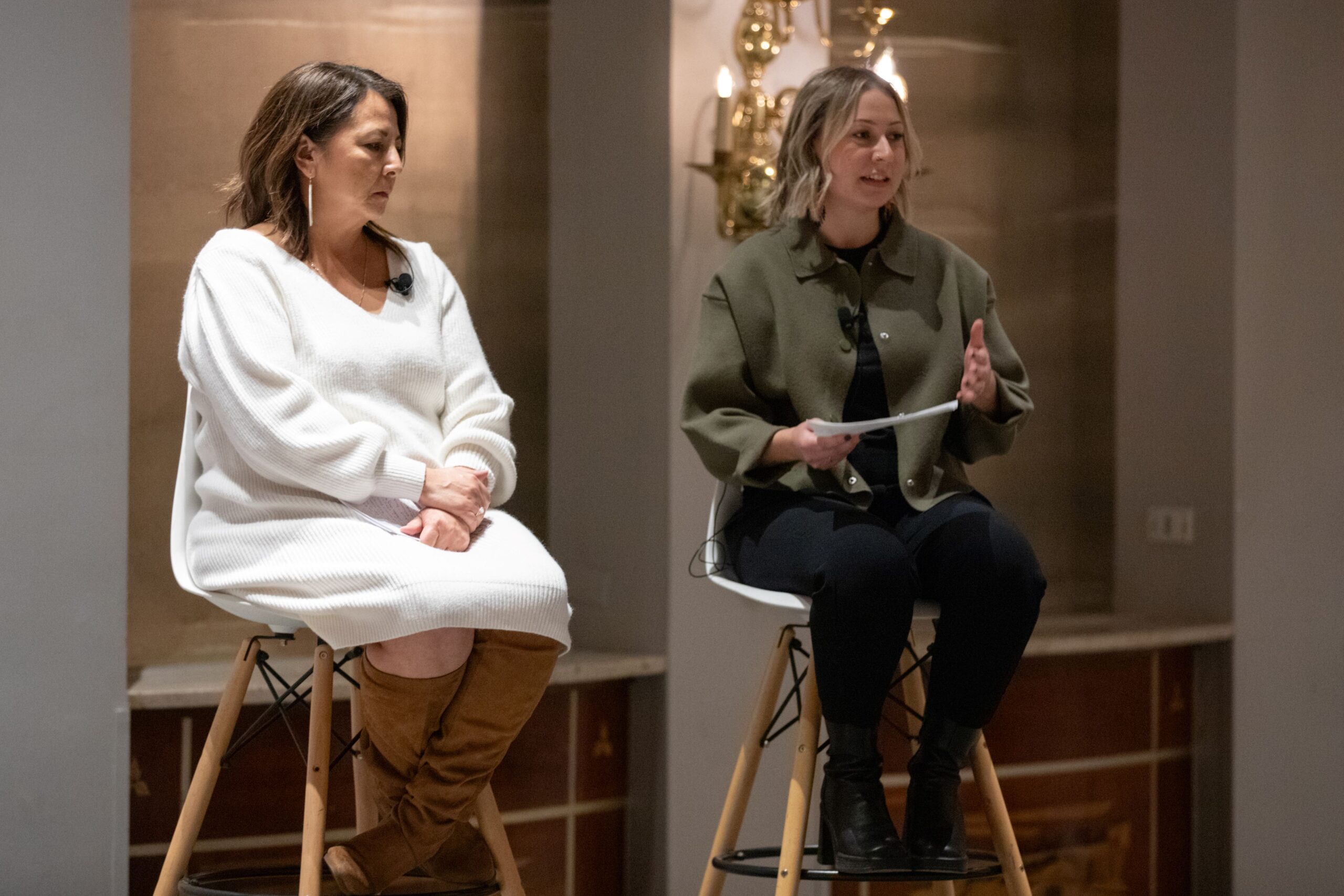
“Allyship is transferring the benefits of your privilege.”
Catalyst research found that more than half of Indigenous people in Canadian workplaces experience emotional tax, or the need to be on guard against bias and racism. For Indigenous women, 67% report feeling on guard against bias on their work teams and 63% report not feeling psychologically safe.
Maddy Fleischhacker Parenteau of ATCO shared her experiences with this saying, “Emotional tax is subconscious but affects all my daily interactions. I always have an answer or a justification ready for a question. If I’m in a boardroom, I always feel the need to be on guard to ask why I’m there.”
Parentau added that “the path toward reconciliation cannot be left solely to Indigenous people; it’s all of our responsibility to be a part of that. I have witnessed many wonderful allies in my life and at ATCO that have really made space for Indigenous voices to be heard. Allyship is transferring the benefits of your privilege to those who have less.”
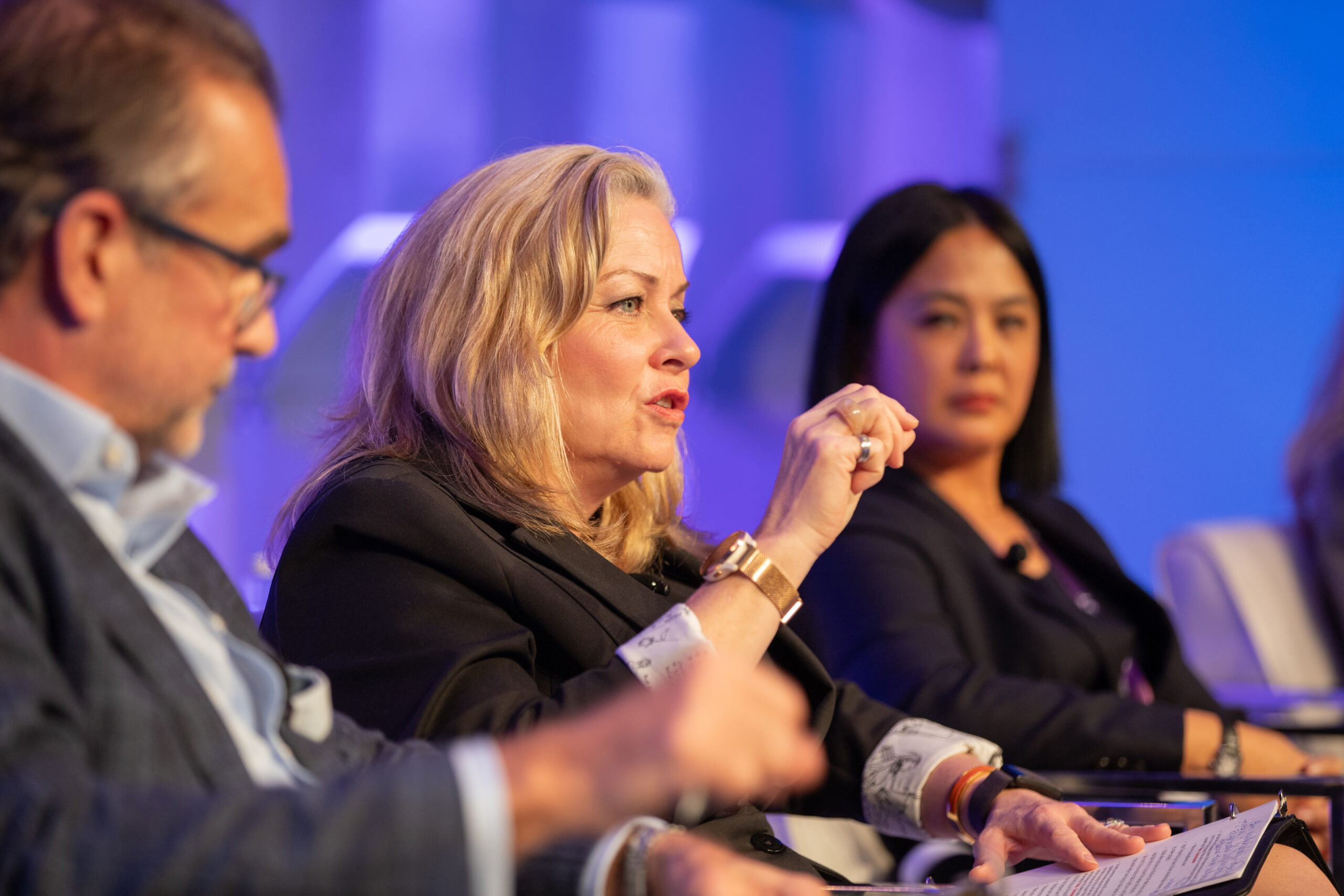
Nothing is more important than talent.
The Conference closed with a CEO discussion on “DEI fatigue.” Linda Hasenfratz, CEO of Linamar, said that it does not make rational sense to be tired of DEI because “diversity lets us tap into 100% of the talent pool. So, if you’re encountering fatigue, push back hard and say, ‘There’s nothing more important than talent.’”
As Catalyst Honours Champion Jeahnette Cavaliere of Wells Fargo, said, “It’s important to always regroup, step back, and see that we are achieving results. We are on a journey. [Change] won’t happen overnight. We are all here because we know we need change still.”
Susannah Pierce, President and Country Chair, Shell Canada Limited, noted, “We are in a volatile and polarized world today, and when people are stressed, they go towards comfort, which often means they go towards what they are familiar with—the opposite of diversity. As leaders, we need to pay attention and go into the dark corners [to ensure diversity].”
Phil Verster, President & CEO of Metrolinx challenged other leaders to do the hard things. “It’s incumbent upon us as leaders to identify with what we really want to achieve on DEI. If organizations treat it as a tick-box [or] as a KPI rather than as part of your DNA, then you get fatigued with it for sure.”
An in-person Awards Ceremony and Dinner followed the day-long Conference. Dinner included remarks from Dr. Julie Cafley; Lorraine Hariton, Catalyst President & CEO; Darryl White, BMO CEO and Dinner Chair; aAnthony G. Ostler, President and CEO, Canadian Bankers Association; and all seven Honourees. Barb Mason, Group Head and Chief Human Resources Officer, Scotiabank, also received a Community Spotlight award.
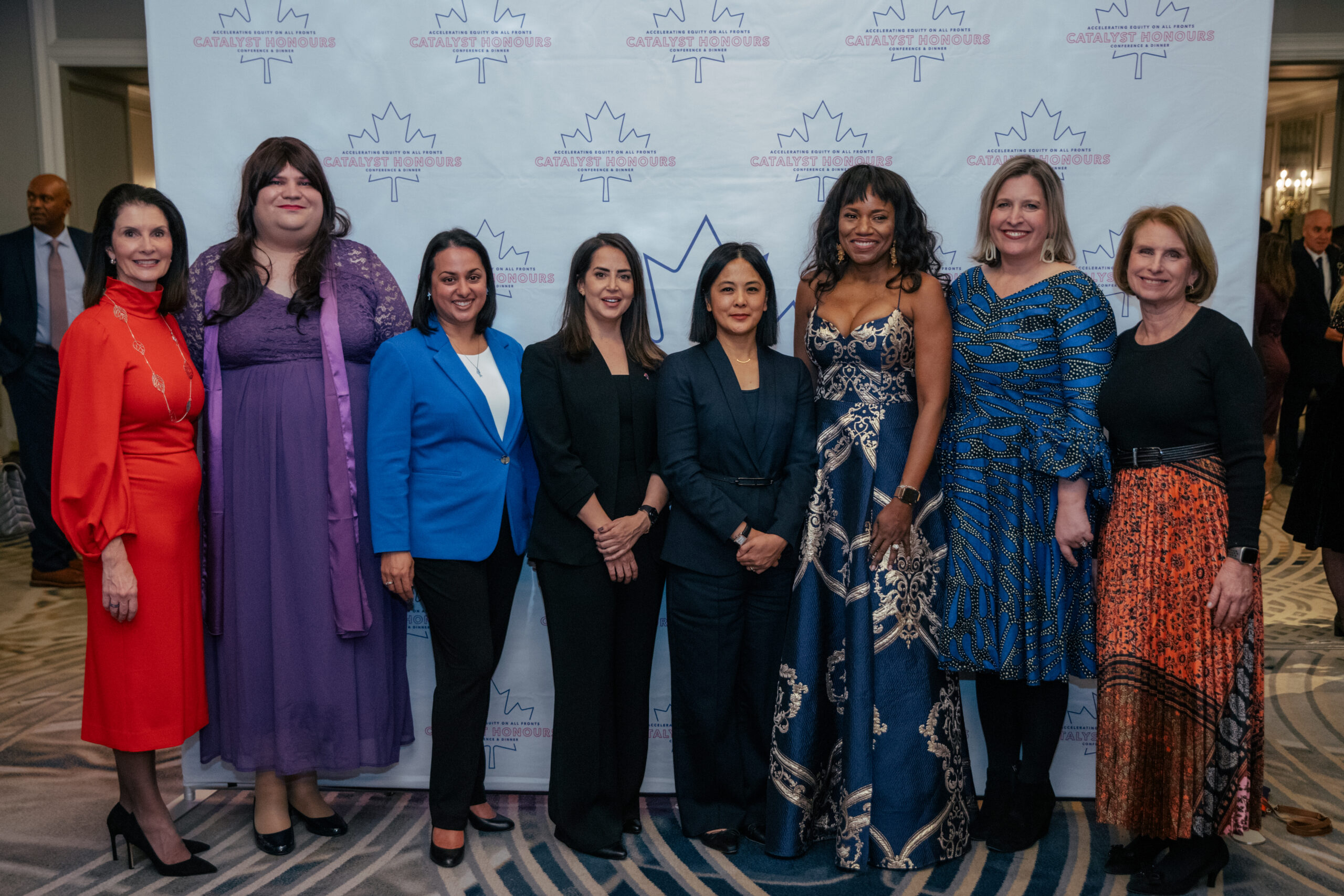
We would like to extend a special thank you to our 2023 Convening Sponsor, Accenture, and all other sponsors.
Want to know about next year’s Catalyst Honours? Sign up now and we’ll email you when registration goes live!